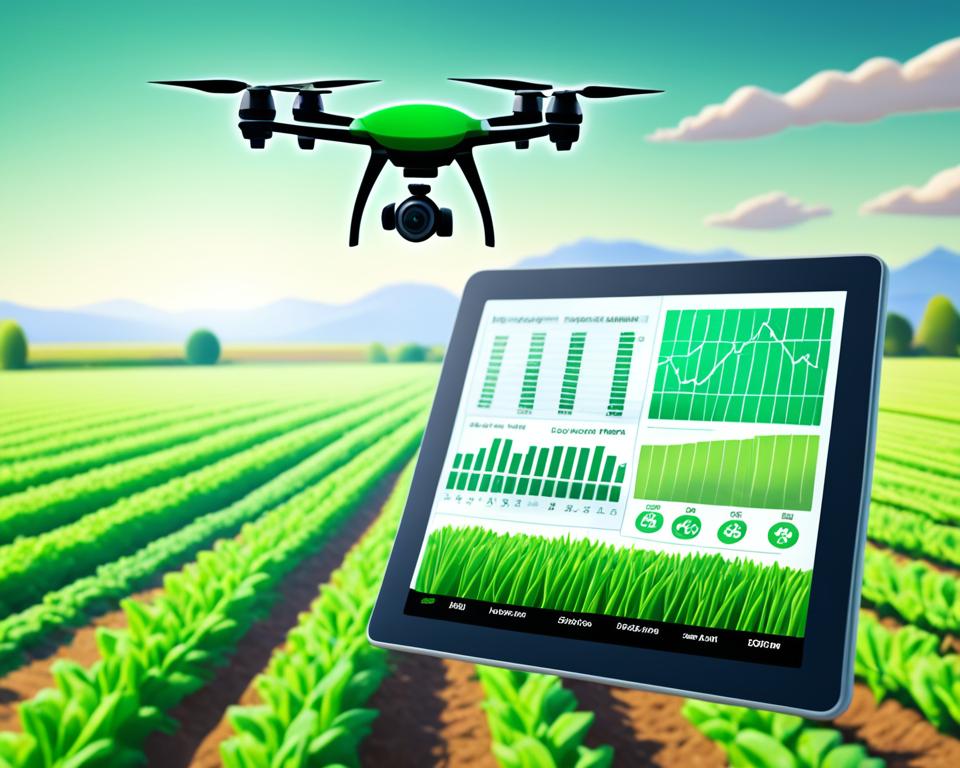The agricultural industry has witnessed a remarkable resurgence in recent years, particularly in the aftermath of the COVID-19 pandemic. Factors like soaring commodity prices and supply constraints due to the war in Ukraine have presented lucrative investment opportunities in the agricultural tech sector. For those interested in investing in agricultural tech, various options like exchange-traded funds (ETFs) and individual stocks of agricultural technology companies are available.
Key Takeaways:
- Investing in agricultural tech stocks can provide long-term growth opportunities.
- Exchange-traded funds (ETFs) like iShares MSCI Agriculture Producers ETF can be an accessible investment option.
- Consider individual stocks of established agricultural companies for potential dividend-paying investments.
- Top agriculture stocks to consider include Archer-Daniels-Midland, Bayer, Bunge, Scotts Miracle-Gro, Corteva, Nutrien, FMC Corp., and Tyson Foods.
- These companies operate in various segments of the agricultural industry, such as processing, biotechnology, fertilizers, and meat production.
Table of Contents
Archer-Daniels-Midland
Archer-Daniels-Midland (ADM) is an agricultural giant that has established itself as a global leader in the industry. The company specializes in processing and trading a wide range of products, including food ingredients, animal feeds, and biofuels.
ADM possesses a diverse portfolio, with a significant focus on the production of key crops such as soybeans, corn, and wheat. In addition to traditional agricultural products, the company has also spearheaded innovation in the industry by developing unique offerings such as textured vegetable protein and high-fructose corn syrup.
As one of the largest companies in the world by revenue, ADM has demonstrated exceptional stability and longevity. The company is proud to have paid dividends to its shareholders for an impressive 91 consecutive years, exemplifying its commitment to investor returns.
With its vast economies of scale, ADM is well-positioned to capitalize on the increasing global demand for food and biofuels. As the world population continues to grow, the need for sustainable agricultural practices and efficient food production becomes more critical than ever.
By successfully integrating its operations and leveraging its extensive expertise, ADM consistently delivers value to its customers and shareholders alike. Through its dedication to excellence and continuous innovation, the company remains at the forefront of the agricultural industry.
ADM’s Key Business Segments:
- Food Ingredients
- Animal Feeds
- Biofuels
ADM’s Strengths:
- Global reach and presence
- Diversified portfolio of products
- Long-standing track record of dividend payments
- Economies of scale and vertical integration
- Commitment to sustainability and innovation
ADM’s Financial Performance:
| Year | Revenue (in billions) | Net Income (in billions) |
|---|---|---|
| 2020 | $64.36 | $1.93 |
| 2021 | $74.61 | $2.52 |
| 2022 | $82.71 | $3.08 |
Bayer
Bayer is a diversified company with a focus on agriculture, healthcare, and consumer goods. In the agricultural sector, the company is known for its crop protection products and seeds. It acquired Monsanto, the maker of Roundup, in 2018, solidifying its position in the agricultural industry. Bayer reported record revenue in its crop science division in 2022, driven by tight supply and higher prices for glyphosate-based products. With its strong presence in the market and innovative agricultural technologies, Bayer is well-positioned for growth in the agritech sector.
With a diversified portfolio and a long history in the industry, Bayer has established itself as a key player in the agricultural sector. The company’s crop protection products, such as herbicides, insecticides, and fungicides, play a crucial role in ensuring the health and productivity of crops. Additionally, Bayer’s seeds division develops and offers a wide range of high-quality seeds tailored to the needs of farmers worldwide.
By acquiring Monsanto, Bayer gained access to Roundup, a widely used herbicide. While Roundup has faced controversies regarding its potential environmental impact, the acquisition of Monsanto has bolstered Bayer’s position in the market and expanded its product offerings.
Bayer’s commitment to innovation is evident in its focus on developing advanced agricultural technologies. The company invests heavily in research and development to create breakthrough solutions that address the challenges faced by farmers, such as pest control, disease management, and increasing crop yields.
Bayer’s Impact on Sustainable Agriculture
Bayer is actively involved in promoting sustainable agriculture practices. The company is dedicated to ensuring that its products are safe, effective, and environmentally friendly. Through its expertise in crop protection, Bayer aims to help farmers minimize the use of chemicals and reduce their impact on the ecosystem.
In addition, Bayer recognizes the importance of digital technologies in driving agricultural innovation. The company harnesses data analytics, artificial intelligence, and precision farming techniques to optimize resource allocation, improve efficiency, and enhance sustainability in farming operations.
Overall, Bayer’s diversified portfolio, commitment to innovation, and focus on sustainable agriculture position the company as a leader in the agritech sector. With its crop protection products, seeds, and advanced technologies, Bayer is poised to drive positive change and contribute to the future of agriculture.
Bunge
Bunge is a diversified agriculture company, playing a significant role in various sectors of the industry. The company engages in oil production, milling, grain, sugar, and ethanol production, making it a key player in the global agricultural market.
In recent years, Bunge has demonstrated its strength and growth potential, posting record results in 2022. The company achieved impressive revenue and net income growth, solidifying its position as a leader in the industry.
Bunge’s business model revolves around buying commodities and adding value through milling and oil production. While this model may result in a relatively low gross profit margin, it allows the company to leverage its expertise and resources to add significant value to its products.
Looking forward, Bunge is well-positioned to capitalize on the tight supply and higher commodity prices expected to continue in 2023. With its diverse operations and strong market presence, the company is poised for another successful year.
Key Highlights:
- Diversified agriculture company involved in oil production, milling, grain, sugar, and ethanol production
- Posted record results in 2022 with strong revenue and net income growth
- Business model focuses on buying commodities and adding value through milling and oil production
- Well-positioned to benefit from tight supply and higher commodity prices in 2023
To get a better understanding of Bunge’s performance and growth, let’s take a look at the key financial figures:
| Year | Revenue (in billions) | Net Income (in millions) | Gross Profit Margin |
|---|---|---|---|
| 2020 | $41.07 | $1,192.00 | 8% |
| 2021 | $51.61 | $2,034.00 | 9% |
| 2022 | $58.46 | $2,730.00 | 7% |
Conclusion
The agricultural tech sector presents exciting investment opportunities for those looking to invest in the future of agriculture. With the global agritech market projected to reach $75.87 billion by 2032, the industry is experiencing rapid growth due to the adoption of advanced technologies and digitalization in farming practices. Agricultural tech stocks hold significant potential for investors as they leverage precision farming techniques, data management systems, and sensor technologies to optimize agricultural processes and enhance crop yields. By investing in these agritech stocks, investors can take advantage of the growing demand for food and the need for sustainable agricultural practices.
Investing in agricultural tech enables individuals to contribute to a more efficient and sustainable food production landscape. As the world’s population continues to grow, the demand for food is increasing, necessitating innovative agricultural solutions. Agritech companies are at the forefront of this innovation, developing technologies and tools to improve productivity and reduce the environmental impact of farming. By carefully researching and considering investment preferences and risk tolerance, investors can identify promising agritech stocks that align with their long-term growth objectives.
Overall, the agricultural tech sector offers a compelling investment proposition for individuals seeking to diversify their portfolios and support the future of sustainable farming. By capitalizing on the burgeoning opportunities in the agritech market, investors can participate in the transformative changes taking place in the agricultural sector. It is crucial for investors to conduct thorough due diligence, keeping in mind the potential risks and rewards associated with investing in agricultural tech stocks. With careful consideration and strategic investment decisions, investors can position themselves to benefit from the continued growth of this dynamic industry.


